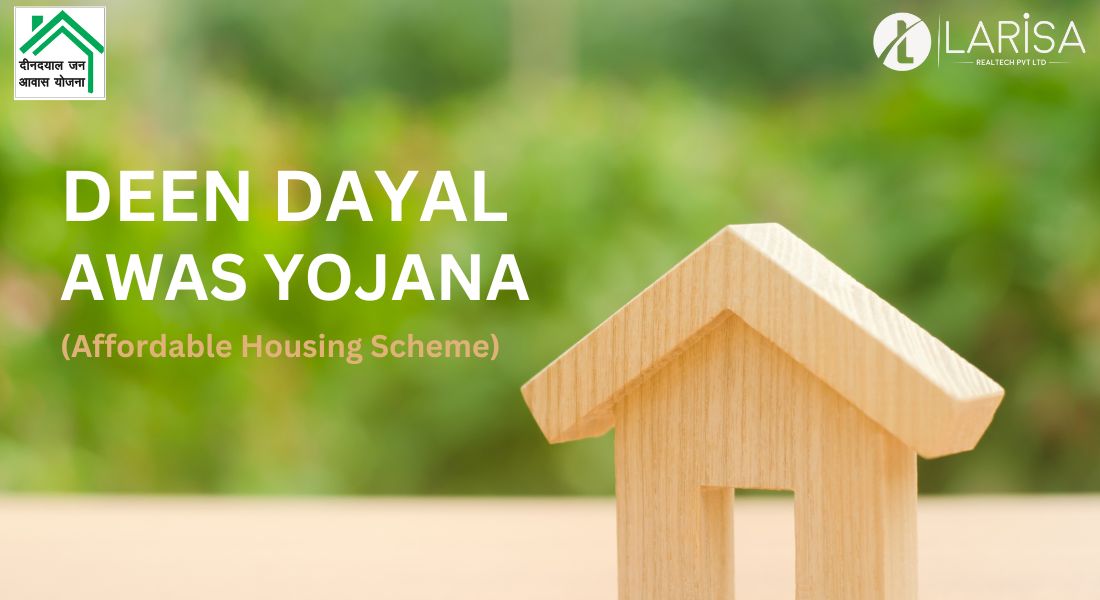
Deen Dayal Awas Yojana
DDAY (Deen Dayal Awas Yojana) is an affordable housing scheme launched by the Government of India to provide affordable housing to the poor people of rural and urban. This scheme was launched in 2016 and is part of the (PMAY) Pradhan Mantri Awas Yojana scheme, which aims to achieve the goal of “Housing for All” by 2022.
The Deen Dayal Awas Yojna focuses on providing financial support to families and individuals and families belonging to the low-income groups (LIG) and economically weaker sections (EWS) for the improvement, construction, extension, and of their houses. The scheme offers loan and subsidy options to make housing more accessible and affordable for those who cannot afford to buy or construct a home.
In this blog, Larisa Realtech, will give you information regarding critical features, Eligibility Criteria, Documents, and online application to this scheme. So let us start this blog with key features.
Key features of the Deen Dayal Awas Yojana include:
1. Subsidy on Home Loans: Under this scheme, eligible beneficiaries can avail of interest subsidies on home loans. The subsidy amount varies and is based on the loan amount and income category and the.
2. Affordable Housing Units: The main aim of this scheme is to promote the construction of affordable housing units by providing financial help to the beneficiaries. This includes support for constructing new houses, enhancing existing houses, and improving basic infrastructure.
3. Beneficiary Categories: The scheme targets different beneficiary categories, including individuals from the EWS and LIG sections, urban poor, slum dwellers, and people living in dilapidated houses.
4. Credit-Linked Subsidy Scheme (CLSS): The scheme offers a credit-linked subsidy scheme where eligible beneficiaries can avail of interest subsidies on home loans, making them more affordable. CLSS is provided directly to the lending institutions, reducing the adequate loan amount.
5. Aadhaar-linked Scheme: The Deen Dayal Awas Yojana is linked to Aadhaar, the unique identification number issued to Indian residents. Aadhaar is used to identify and verify beneficiaries, ensuring transparent and efficient delivery of subsidies.
The Deen Dayal Awas Yojna aims to address the housing needs of the economically weaker sections and provide them with affordable and dignified living conditions. It aligns with the government’s vision of providing housing for all and improving the overall quality of life for the urban and rural poor.
What are the Documents required for Deen Dayal Jan Awas Yojana Haryana?
To apply to this scheme, you need the following documents:
- Aadhar card
- Income Certificate
- Passport Size Photograph
- Bona fide certificate
- A certificate that proves the applicant doesn’t have their own house
- Ration card
- Address proof
- Age Proof, Contact number, Bank account statement
What are the Eligibility Criteria for Deen Dayal Awas Yojana?
- If you want to apply to this scheme, they must be a bona fide of Haryana.
- If you are a non-taxpayer, you will not be eligible to apply.
- Applicants who do not have their own homes can apply for this scheme.
- The applicant should not have any government employee in the family.
- The candidate should be an inhabitant of Haryana.
How to apply Deen Dayal Awas Yojana Online?
- Firstly, the applicant has to visit the official website of deen dayal awas yojna (tcpharyana.gov.in)
- After Opening the website, you must download the Deen Dayal Awas Yojana form.
- After Opening the form, read the form carefully and fill in the required information appropriately.
- Now, the candidate has to attach all the essential documents required for verification
- After filling out the form, the applicants must visit the nearest branch to submit the form.
- In this way, you could apply deen dayal awas yojana.

Deen Dayal Awas Yojana: Benefits
- The government of Haryana launched this scheme in the year 2016.
- This program helps the economically weaker section (EWS) people to buy or construct their home
- Under this scheme, the price of constructed homes is lower for low-income families. The builder and government will build the colonies.
- As per the program, the colonies will develop on 5-15 acres of land bank with the plot ratio of 2 and 150 sq mt area of housing plots.
- 10% of the land area must give to the state government for free to build essential services for the citizens
- Earlier, the government would hold 50% of the saleable area in this scheme, but in 2016 Chief Minister Manohar Lal Khattar canceled this clause.
- In this scheme, low-income families will get their house thanks to Deen Dayal Awas Yojana.
What are the objectives of Deen Dayal Awas Yojana?
The primary Objective of deen dayal awas yojna is to provide affordable housing to economically disadvantaged and low-income families with access to their own houses. Even today, many families in the state are still hit by financial poverty to live in rented homes, kutcha houses, and slums, or they frequently face various challenges in living their life. Therefore the government of Haryana launched the Deen Dayal Jan Awas Yojana to trigger the issue that financially vulnerable families face. Through this scheme, EWS or low-income families can purchase homes at affordable prices.
Conclusion
We hope you read our blog entirely, and all your doubts regarding Deen Dayal Awas Yojna has solved its key features, Benefits, Eligibility Criteria, and Objective. If you have any questions on this topic, please get in touch with us at – 8750 868686.
We deal in residential, commercial, and affordable Properties in Gurgaon. If you want projects under Deen Dayal Yojana, connect with us. Get an Exclusive Deal and Offer on Booking. Free Site Visit Available, 24*7 Service Available. If you find this article helpful, share it with your friend or family, so they will also get some valuable information. Thank you.
Related Post
How to Apply Online Application for Affordable Housing? Online Process
FAQs
What is Deen Dayal Awas Yojana (DDAY)?
Deen Dayal Awas Yojana (DDAY)is a housing scheme launched by the Government to provide affordable home to the rural and urban poor.
Who is eligible to apply for DDAY?
Individuals and families falling under the economically weaker sections (EWS) and low-income groups (LIG) are eligible to apply for DDAY.
How can I apply for DDAY?
Interested individuals can apply for DDAY online through the official website of the scheme or by using the common application forms available at lending institutions and government offices.
What are the benefits provided under DDAY?
DDAY offers various subsidies on home loans, making housing more affordable. This scheme also supports the extension, construction, and improvement of houses and provides basic infrastructure in suitable areas.
How is the subsidy amount determined?
The subsidy is determined on the loan amount and income category. The exact subsidy percentage and cap may vary based on government regulations.
Can I avail of a loan under DDAY for purchasing a house?
DDAY primarily focuses on providing financial assistance for the construction, extension, and improvement of houses. However, some state-specific variations may allow loan assistance for purchasing houses.
Is there any preference given to female ownership?
Yes, DDAY encourages female ownership of houses by offering additional benefits, such as an increased subsidy amount.
How is the subsidy amount disbursed?
The subsidy amount is directly disbursed to the lending institutions by the Central Nodal Agencies (CNAs) appointed by the government. The subsidy is then adjusted against the outstanding loan amount.
Is DDAY applicable across all states in India?
Yes, DDAY is a national program. However, some state governments may have additional components or modifications in line with their local requirements.
What is the role of Aadhaar in DDAY?
Aadhaar, the unique identification number issued to Indian residents, is used for the identification and verification of beneficiaries, ensuring transparent and efficient delivery of subsidies.
Can I avail of the benefits of DDAY if I already own a house?
DDAY primarily aims to assist individuals and families who do not own a pucca house. The specific eligibility criteria may vary, but generally, owning a house already may disqualify applicants from certain benefits.



